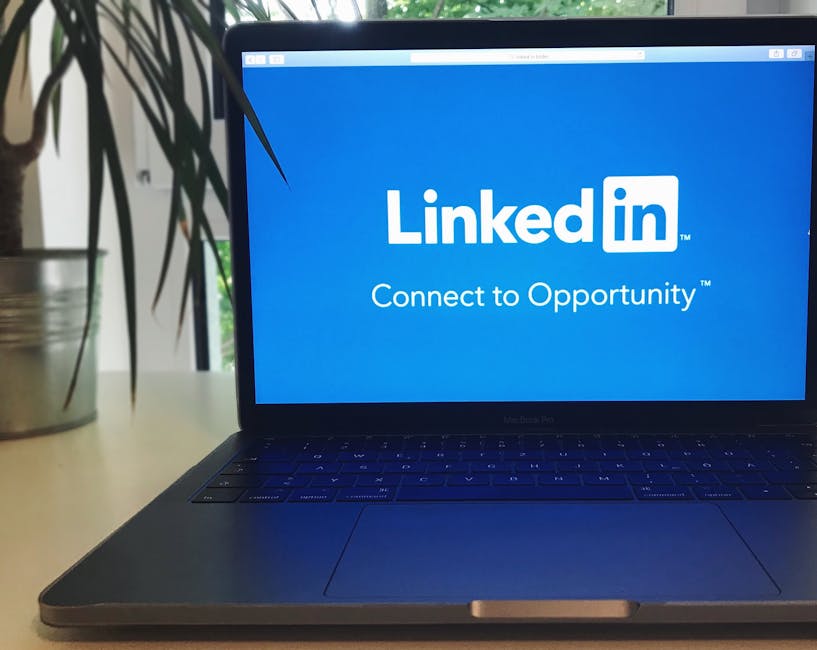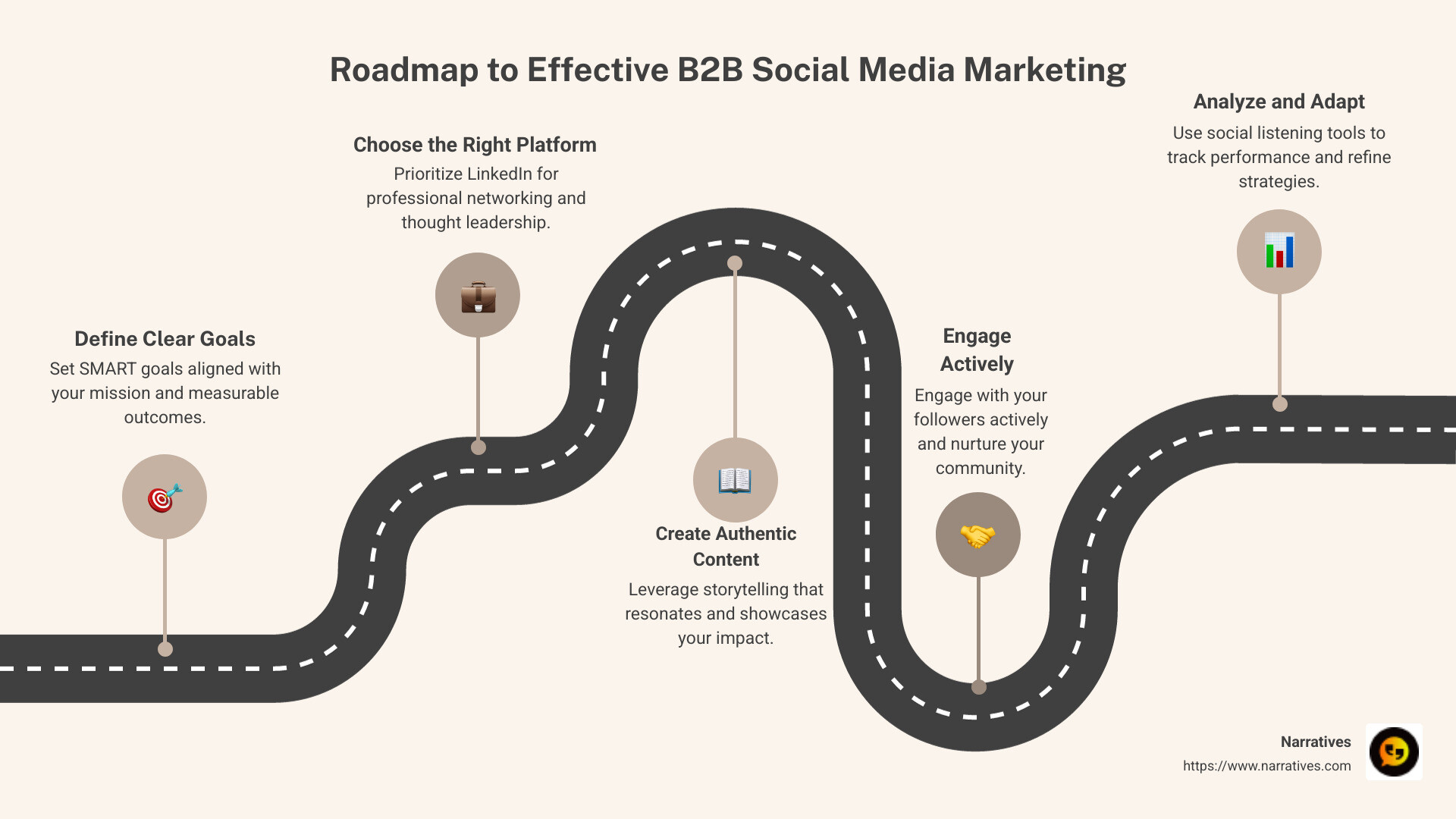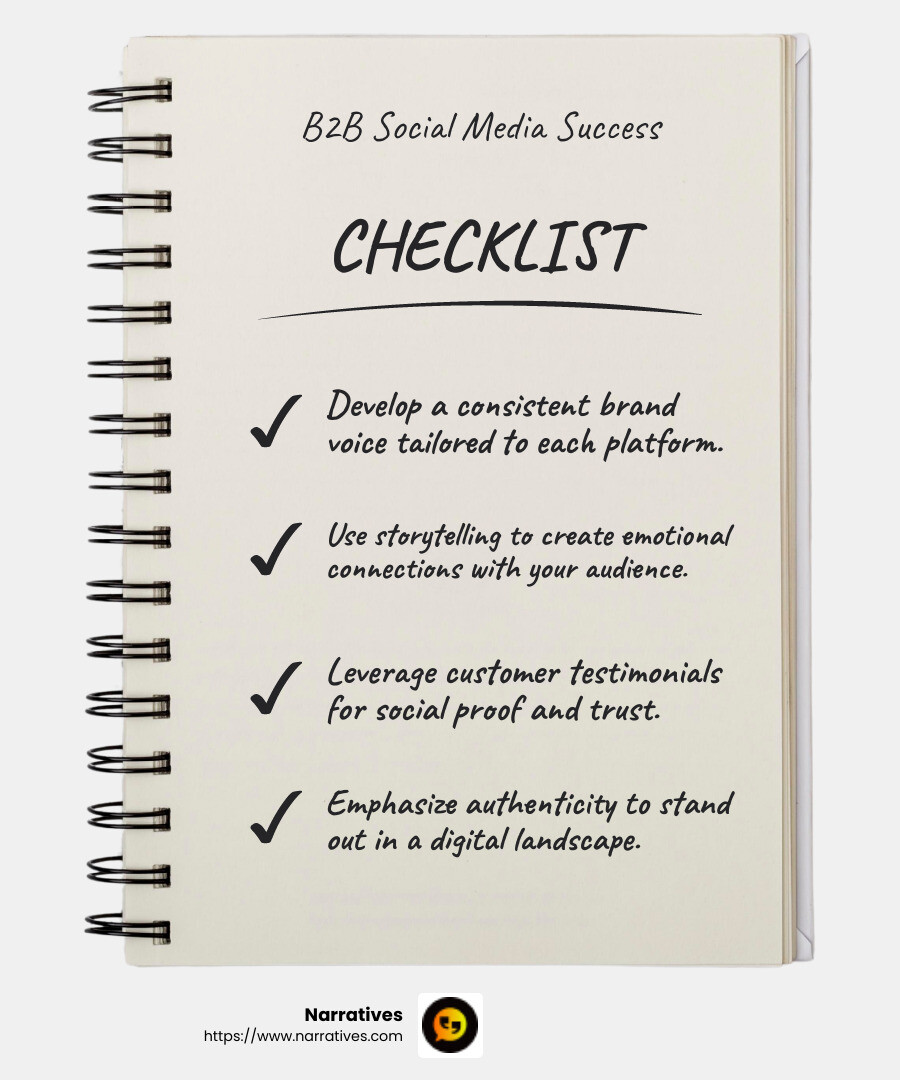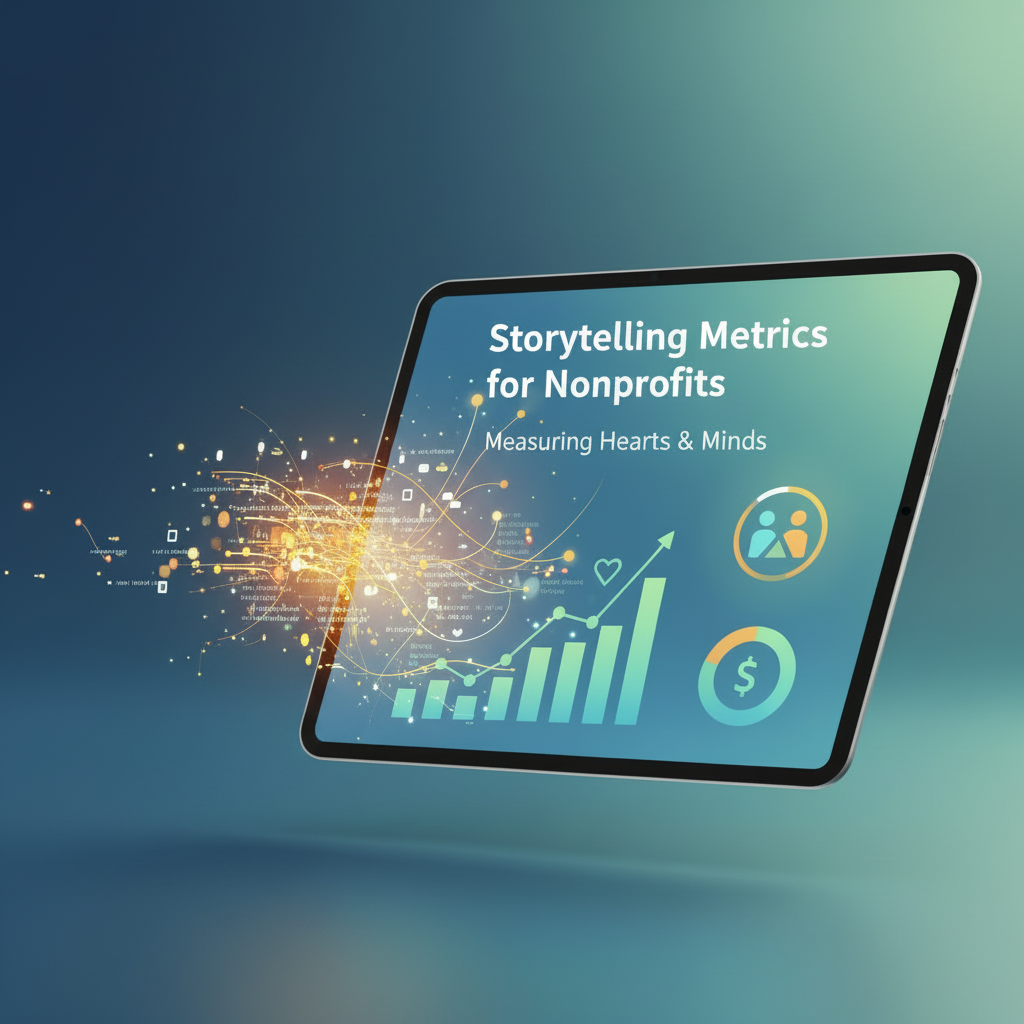B2B Social Media Success: Strategies for the Modern Marketer

Social media marketing b2b is at the heart of modern business communication, especially for organizations that aim to make a difference. Non-profits and social impact groups, in particular, can use these strategies to amplify their mission and engage with their audience in meaningful ways.
Here’s a quick overview for anyone looking to dig into social media marketing b2b:
- Define clear goals: Set SMART goals that align with your mission and focus on measurable outcomes.
- Choose the right platform: Prioritize LinkedIn for professional networking and thought leadership.
- Create authentic content: Leverage storytelling that resonates with your audience and showcases your impact.
- Engage actively: Don’t just post; engage with your followers and nurture your community.
- Analyze and adapt: Use social listening tools to track your performance and refine strategies.
As the digital space continues to evolve, it offers incredible opportunities for values-driven organizations to tell stories that resonate and inspire change. With social media marketing b2b, you can make your mission known and rally support in powerful new ways.
Social media is more than just a promotional tool—it's a platform for authentic storytelling. For those in the non-profit and advocacy fields, storytelling is not just about broadcasting a message but about building a community and creating emotional connections with your audience. By focusing on purpose-driven content, organizations can foster a space where individuals come together around a shared cause, ultimately driving change and increasing impact.

Simple social media marketing b2b glossary:
- social media marketing for b2b companies
- social media digital marketing
- social media marketing solutions
Understanding Social Media Marketing B2B
When it comes to social media marketing b2b, LinkedIn is the go-to platform. It's where business happens. Professionals, especially decision-makers, are actively engaging here. This makes it a goldmine for B2B marketers.
LinkedIn: The Professional Hub
LinkedIn is not just another social media site; it's a professional community. With over 900 million users, it's the ideal place to connect with industry leaders and decision-makers.
Networking Opportunities: LinkedIn allows you to network with potential clients and partners. It's a place to build relationships and establish trust.
Thought Leadership: Sharing insightful content can position your brand as an industry leader. Regularly post articles, updates, and engage in discussions to showcase your expertise.
Engagement: Use LinkedIn to interact directly with your audience. Respond to comments, join groups, and participate in conversations. This boosts visibility and builds relationships.
Engaging Decision-Makers
Decision-makers are key targets in social media marketing b2b. They have the power to make purchasing decisions and influence others within their organization.
Custom Content: Craft content that addresses their specific needs and pain points. Use case studies and data-driven insights to demonstrate how your solutions can benefit them.
Personalized Interactions: Engage with decision-makers through personalized messages and comments. This creates a more meaningful connection and shows that you value their input.
Showcase Success Stories: Highlight real-life examples of how your product or service has helped other businesses. This builds credibility and trust.
Boosting Engagement
Engagement is crucial in B2B marketing. It's not just about posting content; it's about sparking conversations and building a community.
Interactive Content: Polls, Q&A sessions, and live videos can drive engagement. They encourage interaction and make your audience feel involved.
Employee Advocacy: Encourage employees to share content and engage with your brand on social media. Their authentic voices can amplify your reach and foster trust.
Analytics: Monitor engagement metrics to understand what works and what doesn’t. Use this data to refine your strategy and improve future content.
By focusing on LinkedIn and engaging with decision-makers, B2B marketers can build strong, lasting relationships. This is the cornerstone of successful social media marketing b2b. Next, we'll dive into the key strategies that can drive success in this digital landscape.
Key Strategies for B2B Social Media Success
In social media marketing B2B, authenticity, a customer-centric approach, and employee advocacy are essential strategies for success. Let's explore how you can leverage these elements to improve your B2B social media presence.
Prioritize Authenticity
As Merriam-Webster’s 2023 Word of the Year, "authentic" is more than just a buzzword. In a landscape dominated by AI and automation, businesses crave genuine connections. Authenticity is about being real and relatable in every interaction.
Voice and Tone: Develop a brand voice that resonates with your audience. Tailor your tone to fit the platform and the audience you're engaging with. Whether it's a professional tone on LinkedIn or a more relaxed vibe on Instagram, consistency is key.
Storytelling: Share stories that highlight your company's journey, values, and successes. Real stories create emotional connections and make your brand memorable.
Customer Testimonials: Showcase real experiences through customer testimonials and success stories. This not only builds trust but also provides social proof of your product's effectiveness.

Adopt a Customer-Centric Approach
A customer-centric strategy is about understanding and addressing the needs of your audience. It's not just about what you offer, but how you can solve their problems.
Understand Your Audience: Use social listening tools to gain insights into your audience's preferences and pain points. This allows you to tailor your content and messaging to meet their needs.
Engagement: Interact with your audience by responding to comments and messages. This shows that you value their input and are committed to building a relationship.
Personalization: Customize your content to speak directly to your audience's needs. Use data and analytics to create personalized messages that resonate with different segments of your audience.
Leverage Employee Advocacy
Your employees are your greatest assets in social media marketing B2B. They can amplify your brand's reach and credibility through their authentic voices.
Encourage Sharing: Create a culture where employees feel encouraged to share company content. Provide them with the tools and resources they need to be effective brand advocates.
Highlight Employee Stories: Share behind-the-scenes content and employee stories. This humanizes your brand and provides a glimpse into your company culture.
Provide Training: Equip employees with the skills and knowledge to represent your brand effectively on social media. This can include training on best practices and guidelines for sharing content.
By focusing on authenticity, a customer-centric approach, and employee advocacy, you can build a robust and effective B2B social media strategy. These elements will help you connect with your audience on a deeper level and drive meaningful engagement. Next, we'll explore the top B2B social media platforms and how to leverage them for success.
Top B2B Social Media Platforms
In the field of social media marketing B2B, choosing the right platform is crucial. Each platform offers unique opportunities to connect with your audience, share content, and drive engagement. Let's explore the top platforms and how they can contribute to your B2B strategy.
LinkedIn is the powerhouse of B2B social media. With over 760 million users, it's the go-to platform for professionals and decision-makers. According to the Content Marketing Institute, 84% of B2B marketers find LinkedIn to be the most valuable channel for organic social media.
Networking Opportunities: LinkedIn is designed for professional networking. It's perfect for connecting with industry leaders, potential clients, and partners.
Thought Leadership: Share insights, articles, and industry news to establish your brand as a thought leader. This builds credibility and trust with your audience.
Targeted Advertising: LinkedIn's ad platform allows precise targeting based on job titles, industries, and company sizes, making it ideal for reaching specific B2B audiences.
YouTube
YouTube is a powerful platform for video content, which is increasingly important in B2B marketing. Videos can improve your SEO and provide an engaging way to showcase your products and services.
Educational Content: Create tutorials, webinars, and product demos to educate your audience. This content can help solve problems and demonstrate your expertise.
SEO Benefits: Optimized videos can appear in Google search results, increasing your visibility and driving traffic to your content.
Engagement: Encourage viewers to comment, ask questions, and share your videos. This interaction can foster a community around your brand.
Instagram may seem more B2C, but it's gaining traction in the B2B space. Its visual nature allows brands to showcase their culture and creativity.
Visual Storytelling: Use high-quality images and videos to tell your brand's story. Highlight behind-the-scenes content and employee stories to humanize your brand.
Engagement: Instagram's interactive features, like polls and Q&As, offer fun ways to engage with your audience and gather feedback.
Brand Awareness: Use hashtags and explore Instagram Stories to reach a broader audience and increase brand awareness.
TikTok
TikTok is a newer player in B2B social media marketing but has seen massive growth, especially among younger audiences. It's a platform for creativity and authenticity.
Creative Content: Leverage TikTok's format for short, engaging videos. Tutorials, challenges, and educational content can resonate well with users.
Reach Younger Audiences: If your target demographic includes younger professionals, TikTok is an excellent platform to engage them.
Trend Participation: Participate in trends and challenges to increase your visibility and connect with a wider audience.
By understanding the strengths of each platform, you can effectively tailor your social media marketing B2B strategy to reach your audience where they are most active. Next, we'll dive into how to create valuable content that resonates with B2B audiences.
Creating Valuable Content for B2B Audiences
Creating content that resonates with B2B audiences is all about providing value. The goal is to educate, inform, and inspire with every piece of content you share. Let's explore three key elements that can help you achieve this: educational content, thought leadership, and storytelling.
Educational Content
Educational content is the cornerstone of a successful social media marketing B2B strategy. It helps your audience solve problems and understand complex topics with ease.
How-To Guides and Tutorials: Break down processes into simple steps. For example, a software company might create a step-by-step video on how to integrate their tool with existing systems.
Webinars and Workshops: Host live sessions where experts can share insights and answer questions. This format allows for real-time engagement and builds a sense of community.
Infographics and Quick Tips: Use visuals to simplify complex data or concepts. Infographics are easily shareable and can quickly communicate valuable information.
Thought Leadership
Establishing your brand as a thought leader involves sharing unique insights and expert opinions that set you apart from competitors.
Industry Reports and Analyses: Publish reports that highlight trends and data-backed insights. According to the LinkedIn-Edelman B2B Thought Leadership Impact Report, thought leadership content that is practical and backed by data can influence purchasing decisions.
Guest Contributions: Collaborate with industry experts to provide fresh perspectives. Featuring guest posts or interviews can improve your brand's credibility.
Success Stories: Share case studies and testimonials that showcase how your solutions have positively impacted clients. This not only builds trust but also demonstrates your expertise in addressing business challenges.
Storytelling
Storytelling is a powerful tool for creating an emotional connection with your audience. It humanizes your brand and makes your content more relatable.
Brand Narratives: Share the story of your company's journey, values, and mission. This helps build a deeper connection with your audience.
Customer Stories: Highlight real-life experiences of customers who have benefited from your products or services. This approach not only showcases your impact but also provides relatable scenarios for potential clients.
Behind-the-Scenes Content: Give your audience a glimpse of your company culture and the people behind the brand. Sharing stories about your team or community involvement can make your brand more approachable.
By focusing on educational content, thought leadership, and storytelling, you can create valuable content that resonates with B2B audiences. This approach not only builds credibility but also fosters trust and engagement with your brand. Next, let's explore how to leverage analytics and AI to further improve your social media marketing B2B strategy.
Leveraging Analytics and AI in B2B Social Media
In B2B social media marketing, making informed decisions is crucial. This is where analytics and AI come into play, offering powerful tools to optimize your strategy.
Analytics: The Pulse of Your Strategy
Analytics provide insights into what's working and what's not. With tools like Google Analytics or platform-specific insights, you can track metrics such as engagement rates, click-through rates, and conversion rates.
Identify Top-Performing Content: Analyze which posts are getting the most engagement. This helps you understand what content resonates with your audience and informs future content creation.
Audience Insights: Learn about your followers' demographics and behaviors. Knowing who your audience is allows you to tailor content to their preferences, increasing the likelihood of engagement.
Campaign Performance: Track the success of your marketing campaigns. This data helps you allocate resources effectively and make adjustments for better results.
AI Tools: Enhancing Efficiency and Creativity
AI tools are changing how businesses approach social media marketing B2B. They automate routine tasks and provide creative support.
Content Generation: Tools like ChatGPT can help brainstorm content ideas and even draft posts. While AI can kickstart the process, remember to add a human touch for authenticity.
Scheduling and Optimization: AI can analyze past engagement patterns to determine the best times to post. This ensures your content reaches your audience when they're most active.
Real-Time Insights: AI-driven platforms can provide up-to-the-minute insights into trends and shifts in customer sentiment, allowing you to adapt quickly.
Customer Insights: The Key to Personalization
Understanding your customers is at the heart of effective marketing. Analytics and AI provide a deeper look into customer behavior and preferences.
Personalized Content: Use insights to create content that addresses specific customer needs and pain points. Personalization increases engagement and builds stronger connections.
Predictive Analysis: AI can forecast future trends and customer behaviors. This helps in planning proactive strategies that align with market demands.
Feedback Loops: Regularly gather and analyze customer feedback from social media interactions. This data is invaluable for refining your approach and improving customer satisfaction.
Leveraging analytics and AI not only improves your social media marketing B2B strategy but also positions your brand as forward-thinking and customer-centric. As we continue to explore the landscape of B2B social media, let's dig into some frequently asked questions to further clarify and guide your strategic efforts.
Frequently Asked Questions about Social Media Marketing B2B
How can B2B companies effectively use social media?
B2B companies can use social media to build relationships and drive engagement. The key is to understand your audience and create content that speaks directly to their needs.
Engagement: Start conversations by addressing common pain points. Use polls, Q&A sessions, and discussions to engage your audience actively. This not only boosts interaction but also improves brand visibility.
Brand Awareness: Share your company's story, achievements, and expertise. Highlight your unique value proposition to differentiate from competitors. Authentic storytelling can make your brand more relatable and memorable.
Thought Leadership: Position your company as a leader in your industry. Share insights, research, and expert opinions. This builds trust and establishes your brand as a go-to resource for valuable information.
What are the best platforms for B2B social media marketing?
Choosing the right platform is crucial for reaching your target audience effectively.
LinkedIn: The premier platform for B2B marketing. LinkedIn is where professionals connect, making it ideal for showcasing thought leadership and engaging with decision-makers. With over 46 million B2B decision-makers, it's a goldmine for networking and lead generation.
YouTube: Perfect for delivering educational content and product demos. Video content is highly engaging and can significantly boost your brand's reach. Optimized videos can also improve your SEO efforts, appearing in Google search results.
Instagram and TikTok: While traditionally seen as B2C platforms, these can be effective for B2B too. Use them for showcasing company culture, behind-the-scenes content, and creative storytelling to engage a broader audience.
How does AI improve B2B social media strategies?
AI is revolutionizing how B2B companies approach social media marketing by enhancing efficiency and creativity.
Content Ideas: AI tools like ChatGPT can generate fresh content ideas and draft posts. They help overcome creative blocks and speed up content creation, though human input is essential for authenticity.
Scheduling: AI can analyze engagement data to pinpoint the best times to post. This ensures your content gets maximum visibility when your audience is most active.
Real-Time Insights: AI-driven analytics provide up-to-date insights into customer behavior and trends. This allows you to adapt your strategy quickly, ensuring relevance and effectiveness.
Chatbots: Automate customer interactions and provide instant responses, freeing up time for your team to focus on more strategic tasks.
By leveraging these strategies and tools, B2B companies can harness the full potential of social media to drive engagement, build brand awareness, and ultimately, achieve business success.
Conclusion
As we wrap up our exploration of social media marketing B2B, it's clear that the landscape is both challenging and full of potential. Narratives, with its focus on digital storytelling, is uniquely positioned to help non-profits and purpose-driven organizations steer this space.
Digital Storytelling is at the heart of effective B2B social media strategies. It's not just about broadcasting a message; it's about crafting stories that resonate with your audience on a deeper level. By creating emotionally engaging content, businesses can foster connections that go beyond mere transactions. This is particularly crucial for non-profits, where storytelling can inspire action, build trust, and amplify impact.
Narratives excels in this area by elevating underrepresented voices and helping non-profits share their stories in a way that inspires and engages. Our approach is to create high-quality, emotionally resonant content that not only tells a story but also drives tangible outcomes for our partners.
Where attention spans are short and competition is fierce, leveraging the power of storytelling can set your organization apart. By partnering with Narratives, non-profits can ensure their stories are not only heard but also remembered. This can lead to increased visibility, greater support, and ultimately, a more significant impact.
To learn more about how Narratives can help your organization harness the power of digital storytelling, visit our media network services page.
In conclusion, the key to successful B2B social media marketing lies in understanding your audience, crafting authentic stories, and leveraging the right platforms and tools. With these strategies, your organization can build stronger connections, improve brand awareness, and achieve meaningful results.


